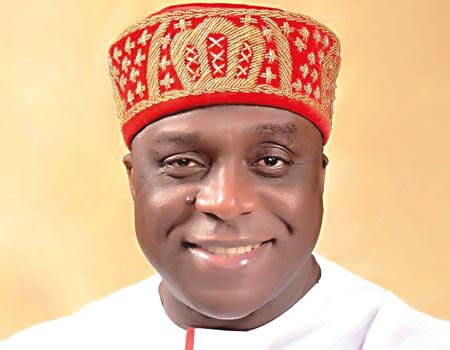
This is contained in a new notice of appeal filed before the appellate court by his legal team headed by Sabastine Hon (SAN).
The notice of appeal which is rooted on 13 grounds further prayed the Court of Appeal to set aside January 12, 2018, ruling of Justice John Tsoho of the Federal High Court which vacated the said consent judgment of December 13, 2017.
Okonkwo also asked the appellate court for an order directing INEC to immediately comply with the consent judgment of Justice Tsoho delivered on December 13, 2017, by issuing him with a Certificate of Return as the winner of the disputed senatorial seat.
In addition, the appellant is seeking an order of the Court of Appeal to the effect that the consent judgment entered into by Justice Tsoho on December 13, 2017 in suit No; FHC/ABJ/CS/1092/2014, ranks superior to any post-election decision, notwithstanding the hierarchy of court established by section 287 and other relevant provisions of the 1999 constitution [as amended],
He further prayed for an order that in spite of the hierarchy of the courts established by section 287 and other relevant provisions of the 1999 constitution [as amended],a pre-election suit and decisions ranks/superior to a post-election decision notwithstanding that the court delivering the pre-election decision is inferior to the court delivering or which has delivered the post-election decision.
The appellant also asked for an order setting aside the order of Justice Tsoho that proceedings in suit No; FHC/ABJ/CS/1092/2014 be adjourned sine die pending the determination of the two appeals filed by the PDP before the Supreme Court.
Specifically, the appellant said his right to a fair hearing was denied by Justice Tsoho when he single-handedly amended the only relief in a Motion on Notice brought by INEC seeking to “vary” his judgment of December 13, 2017.
He maintained that “the learned trial judge suo motu, held that the word “vary” means “vacate”, without giving the parties, especially the appellant an opportunity to address him on that”.
Okonkwo also raised questions about Justice Tsoho’s decision to hold that INEC’s sole relief was not vague on the ground that other contents of the Motion on Notice saved it.
He argued that by adding the word ‘vacate’ to the Motion on Notice by INEC, Justice Tsoho went out of his way to decide on what was not asked for by INEC.
Reminding that his suit emanated from a pre-election situation, Okonkwo also reminded the court that all matters relating to the Court of Appeal which Justice Tsoho relied upon in delivering his ruling, were all from post-election litigations.
The appellant also informed the Court of appeal that Justice Tsoho was wrong to have held that a consent judgment is not a judgment on the merits and could be set aside through a motion on notice adding that “a consent judgment is recognized under section 241(2)(c) of the of the constitution of the Federal Republic of Nigeria, 1999 as amended as a final judgment against which an appeal could only be lodged with leave”.
He said that “it is settled law that the only means by which a consent judgment could be set aside by a trial court is by way of a fresh action and not by a mere motion on notice”.
No date has yet been fixed for the matter at the Court of Appeal.





